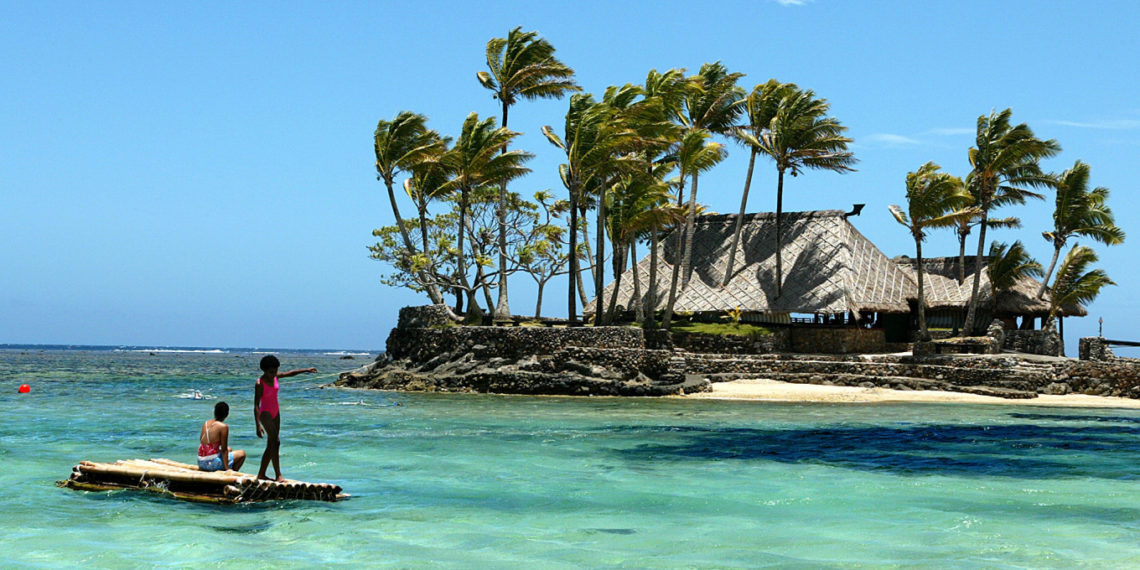No word is more synonymous with China’s conduct in the Pacific than expansionism. The communist state owes this sinister disrepute to many egregious acts. Gorging countries with duplicitous investment schemes and bullying neighbors are just the tip of the iceberg that is Beijing’s political agenda.
Despite these controversies, China is marching on. In 2019, the governments of the Solomon Islands and Kiribati – two island nations in the Pacific – undertook a drastic foreign policy volte-face, shifting diplomatic allegiance from democratic Taiwan to authoritarian China.
Other nations in the region are also considering cooperating with Beijing, with Palau and Papua New Guinea representing the two notable exceptions.
US and Australia: Plenty to Lose
The United States and Australia have plenty to lose from the region’s usurpation by China.
For Canberra, it risks stymying any attempts at an independent foreign policy, since China already wields economic influence over the local markets and hardly shuns from exploiting this. The Communist Party’s most recent saber-rattling involved suspending meat imports from major abattoirs and placing barley tariffs to rebuke the Australian government’s calls for an inquiry into the COVID-19 origins.
For Washington, giving way to such encroachments will undermine President Donald Trump’s China policy when the U.S. economy has already been crippled by the coronavirus and the drop in oil prices.
Wake Up Call
As one hand up its sleeve is weakened, the White House must look for new leverage mechanisms against the East Asian superpower and reverse its traditional neglect of the island states in tow with Australia.
As one 60 Minutes Australia investigation has concluded, those nations turn to Beijing only because the West has chosen not to compete in the first place.
Certainly, committing to this fray is no silver bullet to the issue of Chinese expansionism. Still, it is better to enter the scramble for the region than to withdraw without mounting any resistance to this strategic rival.
In truth, neither Australia nor the U.S. has overlooked the Pacific completely up to this point. Though Australia’s aid budget has consistently been shrinking since 2013, the government last year reallocated large portions of the funding to the Pacific.

Lasy year, the U.S. Agency for International Development (USAID) donated $441 million to electrify 70 percent of Papua New Guinea by 2030.
Furthermore, Australia and the U.S. are contemplating establishing a naval base on Papua New Guinea’s Manus Island. The BBC linked this to reports that China was interested in developing a permanent military presence in Vanuatu, some 1900 miles east from Papua New Guinea.
The U.S. and Australia are finally awakening to the possibility of losing influence to an aspiring geopolitical monopolist and are taking measures to counter China.
Catching Up
However commendable this reaction is, there remains catching up to do. China’s soft power strategy offers a stark contrast to those desultory efforts. It forms part of a coherent blueprint to mold the Pacific to the desires of Xi Jinping’s clique and is exemplified in its treatment of the Solomon Islands.
There, Prime Minister Manasseh Sogavare’s 2019 decision to recognize the Communist state immediately paved the path for deals with Chinese firms, making it resemble a dash for cash rather than a comprehensive move.
Sogavare’s trip to Beijing saw him return with leases of mines to mainland businesses and promises to build infrastructure on the archipelago. One company even tried to exploit this climate to rent the whole island of Tulagi.
As Deakin University’s Matthew Clarke purports, “being able to utilize ports for both commercial and presumably military purposes is important to” China’s ambitious plan to reorient global trade. Yet in a country where the majority of enterprises have ties to the state, such a scheme cannot be confined to purely economic concerns.
Strong economic links did not spare Australia from pressure to backtrack on its critical stance on aspects of China’s policies. As the same holds for Palau, Beijing arguably treats economic and political objectives as inseparable.
Slow and Narrow-Minded Response
In this regard, America’s apathy is just as damaging as China’s actions: the U.S. approaches the Pacific issues slowly and narrow-mindedly.
In his book, Asia in the Pacific Islands: Replacing the West, Professor Ron Crocombe elaborates on this reluctance to act. The U.S. supplied no aid to the South Pacific until 1975, later tailoring its amount to what the USSR was giving before eventually reneging on its commitments altogether in 1990.
China naturally filled this void, and whereas the West specializes in grant aid, China employs grants and low-interest loans to tie states both diplomatically and economically. The existing union no doubt vindicates this system’s superiority in securing lasting attachment to the donor.
After 17 years, the Chinese embassy in the Republic of #Kiribati re-opened Friday night. The two countries resumed diplomatic relations in September last year, following Kiribati's decisions to severe ties with Taiwan. pic.twitter.com/z2Kvulxs90
— Global Times (@globaltimesnews) May 16, 2020
Furthermore, the heads of most postcolonial governments are ignored on the global stage, especially by American leaders. Neither Barack Obama nor Trump, both of whom have sought to focus the domestic political discourse on China, registered a single visit to the islands.
Contrastingly, Xi Jinping travels to the Pacific himself and invites its leaders to Beijing, ensuring his support stays visible. As early as in 2006, China chaired the inaugural China-Pacific Island Countries Economic Development and Cooperation Forum.
According to Professor Crocombe, this visibility entices local leaders who “gain political mileage at home from having their handshake with the US [or the Chinese] president shown on domestic television.” The latter’s sympathizers find easy access to high-profile officials, making them more popular electorally than those without such recognition. In turn, by helping its apologists obtain power, China may naturally count on greater gestures of goodwill.
Time to Act
Australia and the United States must ramp up their response. The Pacific nations are no longer the sunny places from holiday postcards, but important points on the map. Failure to pay due heed to them can drive a wedge between the U.S. and the region.
After the pandemic, America will struggle to rely on the same tools as before and must reassess its containment arsenal, adopting a more inventive, auspicious strategy towards China.
In the 20th century, the U.S. was swift to spot Soviet expansionism in Europe and respond with the Marshall Plan. Something similar is needed today; to quote the Palauan president, “Just one investment can go a long way.”
Disclaimer: The views and opinions expressed here are those of the author and do not necessarily reflect the editorial position of The Globe Post.






















